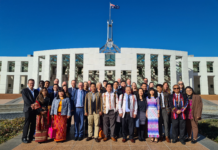
After church on Sunday, it is common to hear comments about ‘the worship’ (typically meaning: the songs) or about the sermon. While songs, style, sermon content and the preacher’s delivery are all important and valid features of a church service, there is much more that goes into a worship gathering that is worth some thoughtful evaluation.
By evaluating church services beyond just the songs and the sermon, we can begin to focus on some of the other vital aspects of what it means to engage in a healthy and robust Christian worship experience. I’ve created a list of 10 themes (in alphabetical order from A to J) as a starting point, with some questions to get us thinking more deeply about the purpose and content of our gathered worship services.
1. ADORATION (Ps 29:1-2, 96:8; Heb 12:28)
- In our worship gathering, are we expressing adoration for God by giving Him the praise, honour and glory that He is worthy of?
- Are we displaying gratitude, awe, thankfulness and love for God in the ways that we worship Him?
- Are we communicating to God and others how highly we value what God has done for us through Christ?
2. BIBLE (2 Tim 3:16-17; Rom 12:2)
- Are we reading the Bible, corporately and individually, as central part of our worship gathering?
- Are we not only reading the Word, but also allowing the Word to ‘read us,’ transforming our thinking and challenging our perceptions toward a kingdom mindset?
3. CUSTOMS (Luke 22:19; 1 Cor 11:23-26)
- Are we utilising appropriate customs and traditions in worship (Sacraments, Creeds, Prayers, Songs etc.) that help us to clearly remember and proclaim Christ together, enter into His unfolding story of redemption, and lead us to respond to Him in meaningful ways?
- Are our customs and traditions relevant, engaging, vital and meaningful to those present?
4. DECISIONS (Ps 147:11; Prov 3:5-6)
- Are we making decisions of trust and faith as we gather to worship – decisions that help us (both corporately and individually) to follow Christ in steps of discipleship?
- Are we offering opportunities for people to submit their lives in obedience to God, in whatever aspect of life they feel called and convicted to respond by the leading of the Holy Spirit?
5. EDIFICATION (1 Cor 14:26; Eph 4:11-12; 1 Thess 5:11)
- Are we intentionally building up other believers through the faithful preaching of the word, the use of Spiritual gifts, and through encouragement in order that we are being strengthened in our faith?
- Are people being raised up and released into their areas of spiritual gifting in order that they might edify the Body of Christ?
6. FELLOWSHIP (Rom 12:5; 1 Cor 12:27)
- Are we engaging with one another below the surface level when we gather for worship?
- As a community, do we value our time together by being punctual, mentally prepared and focused, spiritually engaged and relationally present?
- Do we communicate value for one another in the way we relate to and engage with others in the community of faith, particularly those who are different from us?
7. GENEROSITY (1 Tim 6:17-19; Matt 6:19-34; 2 Cor 9:7)
- Does our worship reflect a generous giving out of our hearts and lives for all that God has done for us? Are we devoting our finances, resources, time, energy, attention and our hopes for the future to God with happy hearts and open hands?
- Are we trusting that God can and will provide for our needs – spiritually, emotionally, physically, relationally, financially and practically?
8. HOSPITALITY (Isa 58:6-7; Matt 25:31-46; Rom 12:13)
- Are we demonstrating love, acceptance, openness and kindness towards visitors and strangers who may be present among us in the worship gathering?
- Are we communicating a loving welcome through being inclusive and by doing our best to make the worship gathering as accessible as possible for those present?
- Are we remembering to look beyond the comfort of our own gathering toward the needs of the poor and needy and the marginalised?
9. INVITATION (Acts 2:38-39; Matt 16:24-25; Jas 5:13-14)
- Are we providing opportunities for people to respond to God in a personal and meaningful way, whether to receive Jesus as their Lord and Saviour, to receive prayer, or to dedicate themselves afresh to the calling and conviction that is laid on their heart by the Holy Spirit?
- Are there opportunities for people to use their spiritual gifts, talents and abilities in the service of the others?
10. JESUS (Heb 12:2; Col 1:15-20; Phil 2:9-11)
- Are we intentionally making the proclamation of Jesus’ name and the declaration of His kingship the central goal of our worship gathering?
- Are we remembering His role as the central character in the narrative of God’s plan to save humanity and recreate the universe?
- Does everything we do in worship reflect His character, His heart, His passion for the lost and for the coming of God’s kingdom?





































Tough duty for the leaders of wiorhsp. If wiorhsp meets that criteria they will come. Spiritual needs and expectations are so varied that most denominations fill only a small portion.